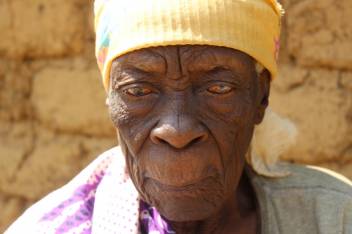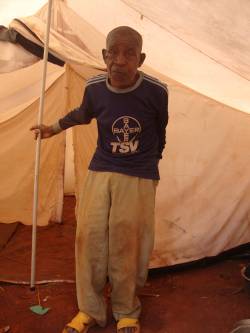According to UNHCR, Tanzania is host to over 70,000 Burundian refugees since May 2015. This is in addition to over 61,000 Congolese refugees that have been living in the country for decades.
The humanitarian needs of older men and women are often complex. Poor mobility, diminished strength, chronic disease and lack of family support often increase older people’s vulnerability in such contexts where survival is a daily struggle.
Forgotten crisis
Older people and people with disabilities are disproportionately affected by armed conflict and disasters, yet less than 1% of international humanitarian aid is dedicated to them. They face significant difficulties accessing appropriate humanitarian goods and services.
Despite its gravity, this current crisis has not received much media attention. Our mandate is to ensure older people’s humanitarian needs are recognised.
We are therefore working in the Nyarugusu camp to provide life saving assistance to older people and ensure we listen to their stories and struggles for survival.
What we’re doing
Our first focus is to work with other humanitarian actors and ensure their services are age-appropriate. With support from the START fund and the Jersey Overseas Aid Commission we have begun providing age-friendly kits which are designed to meet older people’s specific needs. These include mattresses, blankets, sweaters, mobility aids, mosquito nets and some kitchen sets.
In our effort to hear their voices, we met with older men and women who greatly appreciated being recognised: “We are happy to see that there is an organisation that cares for older people. It is like a dream come true. Some of us have been here for 19 years and we have never seen an organisation that dedicates its services to older people.”
We also went to meet some of the most physically frail in their temporary homes. Looking at the physical and health condition of some of the newly arrived Burundian refugees, one wonders how they made the treacherous journey.
Fighting for food
 “My name is Asha*. I am a Congolese. I don’t remember when I was born, but I remember World War I. I came to Tanzania in 1966. I fled my country because of war.
“My name is Asha*. I am a Congolese. I don’t remember when I was born, but I remember World War I. I came to Tanzania in 1966. I fled my country because of war.
“I came here with my daughter who died in the camp in 2005 due to sickness. I now live with my other daughter. Eight of my nine children have died, seven in Congo and one here in Nyarugusu.
“Before coming to live with my daughter, I was living with my granddaughter and her family. She also fell sick and died. One of the reasons I left her family is because I was not being treated fairly.
“I had to scramble for my fair share of food. Sometimes I hadn’t even eaten half my share when they told me the food was finished. At times they would even chase me from their home. My grandson who I came here with as a small baby abandoned me. He said he could not live with an older person who cannot cook for him. My daughter, who I am living with now, makes sure I get my share.
Turned away from hospital
“I have severe backache. At the hospital, they won’t even see me. They once told me I’m too old and that I cannot get services. The other time I went they told me not to come again because the medicine is finished. I have to tolerate the pain. I can’t stand upright. I wish I could get treatment.
“When I was young and energetic, I was a subsistence farmer. I had a small farm that gave me enough to eat.”
With poor mobility and limited access to support, newcomers like Babu Ncube also remain hidden in the crowds of children and women who often make up the greatest numbers in displaced populations.
 Forced to flee time and again
Forced to flee time and again
Ncube* recently arrived from Burundi. He says is 120 years old and lives with his 4 grandchildren.
“I don’t have any children. They were all killed in Burundi in 1993 and their farms were taken. My wife was killed as we were trying to escape.
“The first time I fled my country was in 1972. In 1993 we were taken back but another war broke out immediately and we found ourselves back in Tanzania.
“In 2009 we were again taken back to Burundi. Life was not the same there because I had lost all my property and family. And this year again I was forced to flee again.
“I don’t want to go back again. I just want a peaceful place to live. At the camp there is nothing to do. I’m always sitting here doing nothing. Sometimes I can’t sleep, when all the memories of what happened flash in my head.”
Older people’s contributions not recognised
During our discussions some of the older men and women commented on the inadequacy of basic services such as food, healthcare and shelter and asked agencies to do more. Additionally they also ask those working in the camp to value their skills and consider them for temporary assignments that are often exclusively given to young people.
Despite the widely distributed 2008 recommendations from the IASC’s report on Humanitarian Action and Older Persons, the needs of vulnerable older people continue to be largely unaddressed by humanitarian agencies.
An assumption is still made that older people are reached through general assistance programmes. In light of this exclusion, we believe that specific interventions to protect older men and women must be made urgently.
Read more about work to support older people in humanitarian crises.
*Names have been changed
